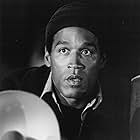An independently produced sports documentary on the career of O.J. Simpson, (32#) the upcoming running back for the Buffalo Bills football team.An independently produced sports documentary on the career of O.J. Simpson, (32#) the upcoming running back for the Buffalo Bills football team.An independently produced sports documentary on the career of O.J. Simpson, (32#) the upcoming running back for the Buffalo Bills football team.
Photos
A.C. Cowlings
- Self - Houston Oilers
- (as Al Cowlings)
- Director
- Writer
- All cast & crew
- Production, box office & more at IMDbPro
Storyline
Did you know
- TriviaIs included as a hidden "Easter egg" feature on the DVD for The Bogus Witch Project.
- Quotes
Howard Cosell: [O.J has] an uncanny instinct for sensing when to make the move, when to make the cut. He can kill you with a headfake, he can kill you with the swiftness of his legs and the ability to be in a direction at any single second. He also kills you with his variation of speed.
- Crazy creditsThere is a post end-credit stinger in which Mr. Foot receives a pedicure.
- ConnectionsFeatures Cade's County (1971)
Featured review
There's nothing precisely to rave about OJ Simpson: Juice on the Loose documentary, but maybe one might think there's more than meets the eye. It's really a basic sort of sports-star profile doc, typical of the era (70's) and practically all adulatory information regarding Simpson's unquestionable skills as a Heisman trophy winning football player. Maybe one puts the the whole trial years back into perspective and expects there to be more of an expose; that it's directed by legendary George A. Romero might also spark interest. As a Romero fan alone I was wondering what he was doing directing this in-between his ultra low-budget horror films of the time. I did see some of his handiwork in the film, which made it worthwhile, but it is also a little boring for the not-too-avid football or Simpson fan.
The start of the documentary is actually a little exciting; the style of montage that happens, and then sparks up here and there, is reminiscent of some of the montage and editing that gives Romero's living-dead pictures its spark. However, this is only in brief shots, as for the most part Romero does it the professional way, leaving not too much room for artistic interpretation (not that I was expecting F for Fake or something). Simpson is an interesting subject, and when it comes time to interview his family- and longtime friend (and later 'driver') A.C. Cowlings- it isn't without something worth to see, if only for nostalgia of a certain kind. But aside from (an all-too brief) appearance by Howard Cosell, the footage on the football stuff is fairly limited. What makes it work is that there is a certain craftsmanship Romero is trying to get with the questions and cut-aways and so forth; I got the impression that Romero might be more of a documentary filmmaker than his reputation makes him out to be (then again, it is really apparent in his early work from the 60's and 70's).
OJ is now an icon, mostly due to other 'reasons', and to see him in his prime and in total control of what he was doing is nice, but it doesn't amount to too much more than a by-the-numbers expose for television (hence even more limited). Reccomendable, of course, even to Romero fans. But don't seek it out thinking you'll spot anything remotely resembling foreshadowing to the events of the 90's.
The start of the documentary is actually a little exciting; the style of montage that happens, and then sparks up here and there, is reminiscent of some of the montage and editing that gives Romero's living-dead pictures its spark. However, this is only in brief shots, as for the most part Romero does it the professional way, leaving not too much room for artistic interpretation (not that I was expecting F for Fake or something). Simpson is an interesting subject, and when it comes time to interview his family- and longtime friend (and later 'driver') A.C. Cowlings- it isn't without something worth to see, if only for nostalgia of a certain kind. But aside from (an all-too brief) appearance by Howard Cosell, the footage on the football stuff is fairly limited. What makes it work is that there is a certain craftsmanship Romero is trying to get with the questions and cut-aways and so forth; I got the impression that Romero might be more of a documentary filmmaker than his reputation makes him out to be (then again, it is really apparent in his early work from the 60's and 70's).
OJ is now an icon, mostly due to other 'reasons', and to see him in his prime and in total control of what he was doing is nice, but it doesn't amount to too much more than a by-the-numbers expose for television (hence even more limited). Reccomendable, of course, even to Romero fans. But don't seek it out thinking you'll spot anything remotely resembling foreshadowing to the events of the 90's.
- Quinoa1984
- Dec 30, 2005
- Permalink
Details
Contribute to this page
Suggest an edit or add missing content

Top Gap
What is the broadcast (satellite or terrestrial TV) release date of O.J. Simpson: Juice on the Loose (1974) in Australia?
Answer

















